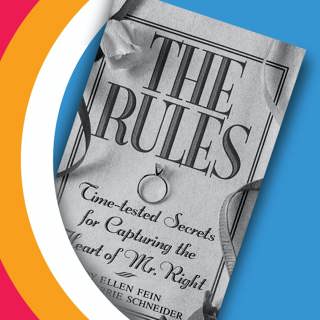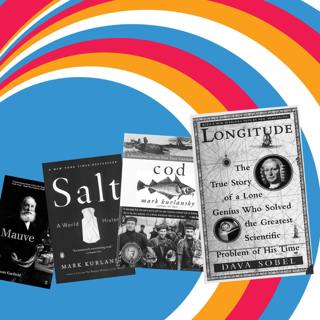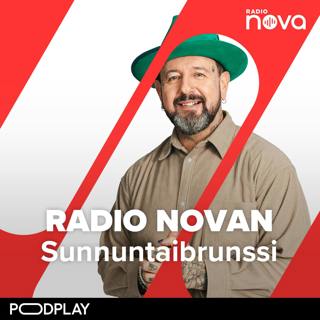
The Dating Manual Unlike Any Other
From the moment it was released in 1995, The Rules was controversial. Some people loved it—and swore that the dating manual’s throwback advice helped them land a husband. Others thought it was retrograde hogwash that flew in the face of decades of feminist progress. The resulting brouhaha turned the book into a cultural phenomenon. In this episode, Slate’s Heather Schwedel explores where The Rules came from, how it became so popular, and why its list of 35 commandments continue to be so sticky—whether we like it or not. Decoder Ring is produced by Willa Paskin and Katie Shepherd. This episode was edited by Willa Paskin. Derek John is executive producer. Joel Meyer is senior editor/producer. Merritt Jacob is our senior technical director. We’d like to to thank Benjamin Frisch, Rachel O'Neill, Penny Love, Heather Fain, Elif Batuman, Laura Banks, Marlene Velasquez-Sedito, Leigh Anderson, Caroline Smith. We also want to mention two sources that were really helpful: Labour of Love by Moira Weigel, a paper called Shrinking Violets and Caspar Milquetoasts by Patricia McDaniel If you haven’t yet, please subscribe and rate our feed in Apple Podcasts or wherever you get your podcasts. And even better, tell your friends. If you’re a fan of the show, we’d love for you to sign up for Slate Plus. Members get to listen to Decoder Ring without any ads. Their support is also crucial to our work. So please go to Slate.com/decoderplus to join Slate Plus today. Learn more about your ad choices. Visit megaphone.fm/adchoices
8 Marras 202337min

Mailbag: The Recorder, Limos, and “Baby on Board” Signs
We receive a lot of fantastic show ideas from our listeners—and we’re grateful for each and every one. For our latest mailbag episode, we’re tackling five of your questions, including “Why the hell do we teach kids to play the recorder?” (We’re paraphrasing a bit.) Also: We’ll explore the rise and fall of the stretch limo, the incredible versatility of the word “like,” the meaning of the “Baby on Board” sign, and why it took so long to develop luggage with wheels. Decoder Ring is produced by Willa Paskin and Katie Shepherd. This episode was also produced by Rosemary Belson. Derek John is executive producer. Joel Meyer is senior editor/producer. Merritt Jacob is our senior technical director. Thank you to every listener who has submitted a suggestion for an episode. We truly appreciate your ideas. We read them all, even if we don’t always respond. Thanks for being a listener and for thinking creatively about this show. If you haven’t yet, please subscribe and rate our feed in Apple Podcasts or wherever you get your podcasts. And even better, tell your friends. If you’re a fan of the show, we’d love for you to sign up for Slate Plus. Members get to listen to Decoder Ring without any ads. Their support is also crucial to our work. So please go to Slate.com/decoderplus to join Slate Plus today. Learn more about your ad choices. Visit megaphone.fm/adchoices
1 Marras 202340min

When Art Pranksters Invaded Melrose Place
In the mid-1990s, the prime time drama Melrose Place became a home to hundreds of pieces of contemporary art—and no one noticed. In this episode, Isaac Butler tells the story of the artist collective that smuggled subversive quilts, sperm-shaped pool floats, and dozens of other provocative works onto the set of the hit TV show. The project, In the Name of the Place, inspired a real-life exhibition and tested the ability of mass media to get us to see what’s right in front of our faces. Decoder Ring is produced by Willa Paskin and Katie Shepherd. This episode was written and reported by Isaac Butler and produced by Benjamin Frisch. Derek John is executive producer. Joel Meyer is senior editor/producer. Merritt Jacob is our senior technical director. Thank you to Jamie Bennett, JJ Bersch, Mark Flood, and Cynthia Carr, whose book On Edge: Performance at the End of the 20th Century inspired this episode. If you haven’t yet, please subscribe and rate our feed in Apple Podcasts or wherever you get your podcasts. And even better, tell your friends. If you’re a fan of the show, we’d love for you to sign up for Slate Plus. Members get to listen to Decoder Ring without any ads. Their support is also crucial to our work. So please go to Slate.com/decoderplus to join Slate Plus today. Learn more about your ad choices. Visit megaphone.fm/adchoices
25 Loka 202341min

The Fast Decline of the Slow Dance
Judging from teen dramas on Netflix, the slow dance seems to be alive and well. But when you talk to actual teens, it’s clear this time-honored tradition is on life support. In this episode, we trace the history of slow dancing from its origins in partner dances like the waltz to the modern “zombie sway” seen at middle-school dances and high-school proms. Plus, former slow dancers offer up stiff-armed, nostalgia-soaked stories about a rite of passage that’s fading fast. Decoder Ring is produced by Willa Paskin and Katie Shepherd. This episode was edited by Zakiya Gibbons. Derek John is executive producer. Joel Meyer is senior editor/producer. Merritt Jacob is our senior technical director. Thank you to Benjamin Frisch and Carlos Pareja. Special thanks to everyone who shared their slow dancing stories, including Ralph Giordano, Matt Baume, Meryl Bezrutczyk, Ari Feldman, Ava Canade, Eileen Zheng, and Harper Kois. Here’s the article by Kyle Denis that we mentioned in the episode: The Death of the Slow Dance? How the One-Time Rite of Passage Has Evolved for Gen Z. If you haven’t yet, please subscribe and rate our feed in Apple Podcasts or wherever you get your podcasts. And even better, tell your friends. If you’re a fan of the show, we’d love for you to sign up for Slate Plus. Members get to listen to Decoder Ring without any ads. Their support is also crucial to our work. So please go to Slate.com/decoderplus to join Slate Plus today. Learn more about your ad choices. Visit megaphone.fm/adchoices
18 Loka 202345min

Fall 2023 Teaser
We’re back with a new batch of cultural mysteries! This season, Decoder Ring explores the decline of an awkward yet unforgettable rite of passage: slow dancing. And, how did millions of TV viewers miss the experimental art installation that was embedded in the 1990s primetime drama Melrose Place? Plus, stories about stretch limos, an ill-fated video game from the makers of Oregon Trail, and the enduring appeal of a controversial dating manual. Launching October 18, 2023. Subscribe wherever you listen to podcasts. Learn more about your ad choices. Visit megaphone.fm/adchoices
11 Loka 20231min

Think Catchphrases Are Dead? Eat My Shorts.
Once you start listening for catchphrases in everyday life—you can’t stop hearing them. From the radio era’s “Holy mackerel!” to Fonzie’s “Ayyy!” to Urkel’s multiple go-to lines on Family Matters, we explore the irresistible quotables from sitcoms, movies and social media that have burrowed into our collective lexicon. Oh, just one more thing… bazinga! (Did I do that?) This episode was written by Willa Paskin, who produces Decoder Ring with Katie Shepherd. This episode was edited by Joel Meyer. Derek John is Slate’s executive producer of narrative podcasts. Merritt Jacob is our senior technical director. Thank you to Luke Winkie, Stephen Langford, Doug Dietzold and The Good, the Bad and the Sequel podcast, and Shawn Green for the suggestion and Urkel clips. If you have any cultural mysteries you want us to decode, you can email us at DecoderRing@slate.com If you haven’t yet, subscribe and rate our feed in Apple Podcasts or wherever you get your podcasts. And even better, tell your friends. If you’re a fan of the show and want to support us, consider signing up for Slate Plus. As a member, you’ll get to listen to Decoder Ring without any ads—and your support is crucial to our work. Go to slate.com/decoderplus to join Slate Plus today. Learn more about your ad choices. Visit megaphone.fm/adchoices
9 Elo 202340min

The Quest for a Homemade Hovercraft
When Slate’s Evan Chung was a kid, he was obsessed with a mysterious advertisement that ran for decades in the scouting magazine Boys’ Life. Under the enticing headline “You Can Float on Air,” the ad assured Evan—and generations of scouts—that a personal hovercraft could be theirs for just a few bucks. In this episode, the adult version of Evan journeys halfway across the country to wield power tools, summon his latent scouting skills, and conscript his father into a quest three decades in the making. Will Evan float on air? Scout’s honor: You’ll just have to listen. This episode was written by Evan Chung, who produced this episode with Decoder Ring’s Willa Paskin and Katie Shepherd. It was edited by Willa Paskin and Joel Meyer. Derek John is Slate’s executive producer of narrative podcasts. Merritt Jacob is our senior technical director. If you haven’t yet, please subscribe and rate our feed on Spotify, Apple Podcasts or wherever you get your podcasts. And even better, tell your friends. If you’re a fan of the show and want to support us, consider signing up for Slate Plus. As a member, you’ll get to listen to Decoder Ring without any ads—and your support is crucial to our work. Go to slate.com/decoderplus to join Slate Plus today. Learn more about your ad choices. Visit megaphone.fm/adchoices
2 Elo 202342min

A Brief History of Making Out
Kissing—the romantic, sexual, steamy kind—is so ingrained in us that it just seems like a fact of life. Like breathing or eating, we just do it. But what if it’s not like that at all? In this episode, we’re going to look at passionate kissing, well, dispassionately, not as something instinctual and innate but as a cultural practice. We’re going to backtrack through history in search of the origins of the kiss, with some surprises along the way. This episode was written by Willa Paskin, who produces Decoder Ring with Katie Shepherd. This episode was edited by Andrea Bruce and Joel Meyer. Derek John is Slate’s executive producer of narrative podcasts. Merritt Jacob is our senior technical director. Thank you to Marcel Danesi. If you’re interested in the papers we mentioned, you can read about Justin Garcia and William Jankowiak’s research, Troels Pank Arbøll and Sophie Lund Rasmussen’s essay, Sabrina Imbler’s When Was the First Sexy Kiss? and the herpes study. (Here’s that bronze-age statue, too!) If you haven’t yet, please subscribe and rate our feed on Spotify, Apple Podcasts or wherever you get your podcasts. And even better, tell your friends. If you’re a fan of the show and want to support us, consider signing up for Slate Plus. As a member, you’ll get to listen to Decoder Ring without any ads—and your support is crucial to our work. Go to slate.com/decoderplus to join Slate Plus today. Learn more about your ad choices. Visit megaphone.fm/adchoices
26 Heinä 202336min






















